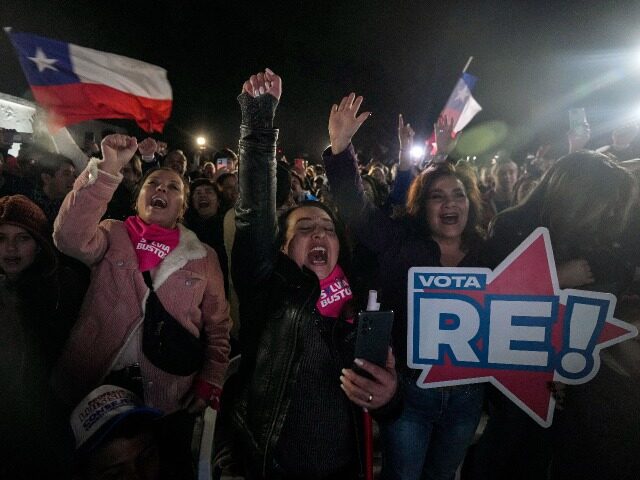Conservative political parties in Chile won a majority of seats in the nation’s Constitutional Council elections on Sunday, clinching the power to draft a new constitution for the country.
The Council, now in its second iteration, is tasked with drafting an entirely new core legal document, replacing the current constitution. Chileans had initially voted to establish the Council and filled it with far-left politicians who drafted a radical leftist constitution. Voters overwhelmingly rejected that proposal in September.
Chile’s Electoral Service office reported that the Chilean Republican Party, the most prominent conservative party in the country, obtained 35.40 percent of the votes, which grants the party 22 of the Council’s 50 seats — enough to exercise veto power against any initiative presented.
The Safe Chile coalition, made up of right-wing parties, obtained 21.07 percent of the votes, which translates into 11 seats at the Council.
The far-left Unity for Chile coalition, to which radical leftist President Gabriel Boric belongs, only won 17 seats with 28.59 percent of the vote.
In addition to entirely new members, the second Constitutional Council will have a 51st member representing Chile’s indigenous populations: Alihuen Antileo Navarrete, who won the position on Sunday by obtaining 52.43 percent of the indigenous vote.
An eventual alliance between the Chilean Conservative Party and the Safe Chile coalition would mean conservatives control 33 seats, more than the three-fifths required to take control of the constituent process.
José Antonio Kast, the head of the Chilean Republican Party and the presidential candidate who lost against Boric in 2021, commented on his party’s crucial electoral victory by expressing that the results are a “tremendous responsibility” for his party and elected councilors.
Kast also remarked that “there is nothing to celebrate, because Chile is not doing well,” referring to the country’s current economic and social problems under Boric’s far-left administration.
“Chile has defeated a failed government, which has been unable to face the security, migratory, economic, and social crises (health, education, housing, and so many others) where everything is going up, homicides are going up, migration is going up, waiting lists and people living in camps,” Kast said.
“We will continue to deeply love our homeland, act with humility, responsibility and with commitment to Chile, what more can you expect from Republicans?” he continued. “It is not time to celebrate, but it is time to work in unity, for the good of Chile.”
President Boric, a major proponent of replacing Chile’s constitution and a key figure in last year’s failed far-left constitutional proposal process, commented upon the results of the election by inviting the Republican Party not to “make the same mistake we made” during the previous failed, far-left constitutional process.
“The previous process, and we must say it, failed because we did not know how to listen to each other among those who thought differently,” Boric said. “This process cannot be one of vendettas, but of putting Chile and its people before personal partisan interests.”
Chile initiated a second constitutional process in March after the previous attempt failed to pass via a national referendum. Replacing Chile’s current core legal structure with a new constitution was the ultimate demand of violent leftist riots that initially began as a protest in 2019 over public transit fare hikes.
The government of then-president Sebastián Piñera eventually agreed to the protesters’ demands and initiated a lengthy two-year constitutional process that carried over to the presidency of Gabriel Boric that produced a far-left constitutional proposal.
The constitutional proposal, praised as the “most progressive in the world” and heavily promoted by international leftist politicians and Hollywood celebrities, sought to make sweeping changes to Chile’s core legal structure, such as the elimination of the Chilean Senate, the decriminalization of abortion at a constitutional level, and declaring Chile as “ecological” through “green” constitutional policies.
The far-left constitutional proposal was overwhelmingly rejected by 61.86 percent of the Chilean electorate in September.
The new process differs from the previous in that instead of having a large Constitutional Convention assembly debate and draft a new constitution from the ground up, the smaller 50-seat Constitutional Council will begin its work by taking a draft prepared by a group of experts previously designated by the Chilean Congress in March as its basis.
The newly elected Constitutional Council can change and add to the base draft and present a finalized proposal, which will be subject to a mandatory nationwide referendum at a later date. The eventual referendum will ask Chileans to choose the new constitutional proposal or keep the nation’s current constitution, approved in 1980 during the dictatorship of Augusto Pinochet and heavily modified throughout the years.
Christian K. Caruzo is a Venezuelan writer and documents life under socialism. You can follow him on Twitter here.

COMMENTS
Please let us know if you're having issues with commenting.